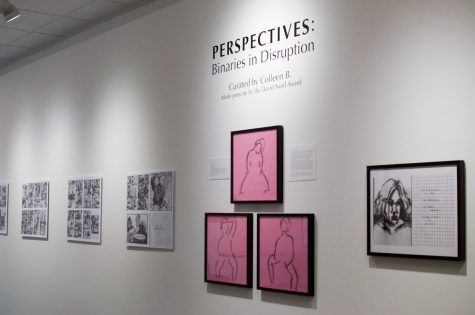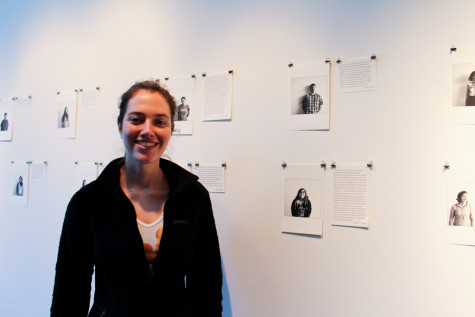Maia Watkins: Addressing Rape Culture
May 21, 2016
The following is an Op-Ed by junior Maia Watkins.
I’m Maia. You may know me as an artist, as a bread baker, the student that spammed the community listserv with Bernie emails, a cyclist, photographer, classmate, friend.
I’m also a survivor of sexual assault. I’m angry. And that anger is powerful.
I am one of the nineteen women that interrupted the final Board of Trustees meeting on April 29th. We demanded an end to the complicit inaction of Whitman College on the issues of sexual misconduct and rape culture. Rape culture is the collection of social norms that accept and perpetuate sexual violence, on this campus and elsewhere, while also stigmatizing those who speak out against them.
Anger requires trust. I engage with you because I have complete trust in this community’s ability to hear me and to change.
I’m going to go a little philosophical here— I believe anger is a secondary emotion, one that comes up all fiery and surprising and uncomfortable when a basic need is not being met. Emotional and physical safety are basic needs that are not available to me as a survivor at Whitman.
I am not safe because we have not made significant changes to the culture in which my assault occurred, or to the fucked up channels that are meant to help survivors seek justice for these crimes. I am unsafe, because when I speak out, I am met with hostility from both the institution and my peers. I am unsafe when assaults happen again and again and campus leaders tell me, “we have done all we can.”
I believe that the hostility we have experienced arises from defensiveness. People care about making this campus safe and have worked hard to implement sexual violence prevention measures. But these measures do not go far enough, and until they do, it is unacceptable to value a party over someone’s life. To make this campus safe, I need Whitties to acknowledge their defensiveness and move beyond it so we can engage in a real, considered, and open discussion.
As of May 6, there have been 45 sexual assaults reported during the academic year. Existing programs, such as Green Dot, are necessary to combat this immediately—but while this epidemic of violence continues to afflict our campus, we must move beyond a reactionary approach. If we think of Green Dot as treating the symptoms of rape culture, we must also find a way to eradicate the disease itself. This means a major cultural shift, changing not only the discourse around sexual assault, but also around the meaning of healthy sexual relationships within our hookup culture.
By calling attention to the Greek community, we demand action from the largest subculture in our student body. I know many Greeks may feel blamed and victimized by our demands. We focus on the Greek system for two reasons:
First, 48 percent of sexual assaults are reported against Greek men, yet Greek men only constitute a third of male-identifying students—which means a disproportionate number of Greek men are identified as perpetrators. But more importantly, the Greek community has the opportunity to catalyze change. We named fraternities because ending sexual misconduct within the Greek system will de-normalize rape culture within the rest of campus.
It’s terrifying to name myself as a survivor and in the same move risk alienating my fellow students. I do it because I am angry. I do it to demand a systematic, intentional change on this campus. I want a campus where I can tell people that I am a survivor without risk of stigma. I want a campus where we talk about sexual misconduct and healthy sexual relationships. I want to end sexual assault at Whitman.
And I know you want the same. You have a responsibility to act. I trust you to act.
What you can do right now: Research sexual misconduct and educate yourself about Title IX. Talk to your friends about what healthy relationships look like. And speak up. Every one of us must join the conversation in order to end the passive silence that perpetuates rape culture.









Knowledge is Violence • May 21, 2016 at 9:41 pm
Replace the anti drinking posters and other polite stuff with sterner writings and graphs. About time.
Anonymous • May 21, 2016 at 7:12 pm
I agree with so much of what you are saying, that we cannot be complicit and passive to what is happening on our campus. The fact that the school has not stepped in and that the burden for supporting the victims of sexual assault has been placed on the students through initiatives like ASC is concerning, because the school is not acknowledging the role they are playing by being silent and not actively supporting student-led initiatives. Silence is a choice and speaks just as loudly as action. If the school is more concerned with getting sued than the safety of it’s students, that’s a huge problem. However, I also feel like there is too much blame being placed on individuals as well as groups of people. The rape culture on whitman’s campus is not occurring in a bubble. The young boys and men in our society are being socialized to view women as sexual objects and to only be concerned about sexual assault because it could happen to their mother, sister, daughter, or friend, not because sexual assault happens to fellow human beings. Just think about the movie we showed on our campus earlier this year, The Mask You Live In. Young boys are simply learning how to relate to women from the culture within which they are socialized. Therefore, the shame and blame that has been placed on individual men, groups of men, and the men on our campus more generally, seems unfair to me because it blames them for the actions they have been taught to view as markers of masculinity within our culture. I believe that in order to create a true culture shift on our campus, we need to work together as concerned men, women, and any other gender/sex identities, rather than putting the blame on a portion of our campus and creating a divide. In order to change a culture, all members who are a part of the culture need to be involved and feel as though they have the freedom to voice their opinions and learn from each other through open, honest dialogue. Additionally, while those who self-identity as male have been socialized to view women as objects of sexual desire, women have been socialized to value their virginity above almost anything else. The cultural obsession with female purity has led women to feel more shame and stigma around causal hookups after the fact, when in the moment the interaction likely may have felt completely consensual. While it’s true that we still live in a patriarchal society, when both parties are drinking to the point where both their memories are fuzzy, it does not seem fair to me to put more blame on those who identify as male than those who identify as female. As a woman and a survivor or sexual assault, I do not want to be seen as a victim. I want to take responsibility for my decision to drink. And although it is easier for women to be “taken advantage of” when they have had too much to drink, if both parties are equally drunk when the encounter happens, it seems unfair to me that those who identify as male are more likely to be blamed and seen as the perpetrator. Rather than blaming each other along lines of sexual identity, I firmly believe we need to have an equal stake in changing the campus culture. Blame prohibits that possibility and I think that framing the current climate of sexual assault on our campus as the fault of half the members of our campus, limits our possibility to make real change and leads to more harm and division rather than productive conversation.
Aditya varma • May 21, 2016 at 11:05 am
You are amazing